Jailed Iranian Activist Denounces Secret Execution Of Protester
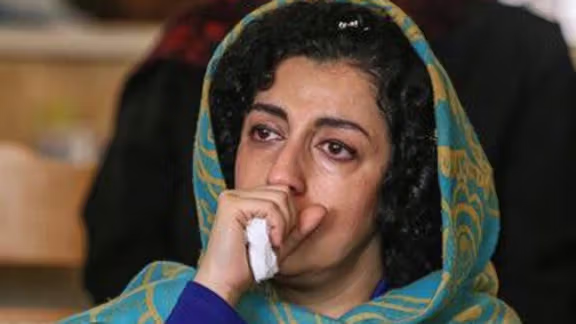
Iranian activist Narges Mohammadi has condemned the clandestine execution of Milad Zohrevand, the eighth protester killed following the Women, Life, Freedom uprising.

Iranian activist Narges Mohammadi has condemned the clandestine execution of Milad Zohrevand, the eighth protester killed following the Women, Life, Freedom uprising.
Nobel Peace Prize Laureate Mohammadi, currently serving time in Evin prison, said, "These executions are a source of shame for the oppressive and repressive government and will make protests more intense over time."
Zohrevand was executed on Thursday in the Malayer prison located in the western province of Hamedan, arrested at the peak of the protests last October. The Hengaw Human Rights Organization revealed that Zohrevand was secretly executed, and his family was denied the opportunity to bid him a final farewell. Zohrevand himself was not notified of his impending execution.
In her Instagram post, Mohammadi wrote of the rising numbers of executions taking place in Iran. "The eighth protester of the "Women, Life, Freedom" movement, Milad Zohrehvand, was executed, and the next day a 17-year-old child was hanged elsewhere. Some time ago, another political prisoner named Qasem Abtahi was executed in Qezelhesar prison," she wrote, referring to a prisoner who was charged while a minor.
"The execution machine has accelerated across the country, conveying the message of the oppressive Islamic Republic to society: the continuation of massacre and execution. I do not consider it anything other than the "war" of the government with all its tools of suppression and death against the oppressed, protesting, and defenseless people of Iran," she added.
According to the United Nations, Iran has killed at least 419 people in the first seven months of the year, a 30% increase from the same period in 2022. The report claimed 239 people — more than half of those executed in the seven-month period — were reportedly put to death for drug-related offenses, a 98% increase from the same period last year.
The 21-year-old, who became a father while in prison, was reportedly not granted the chance to see his newborn child before his execution. In June, he was sentenced to death for the alleged "murder" of an Islamic Revolutionary Guard Corps (IRGC) officer named Ali Nazari during the nationwide uprising sparked by the death in morality police custody of Mahsa Amini. Over 500 protesters were killed by security forces and thousands more arrested.
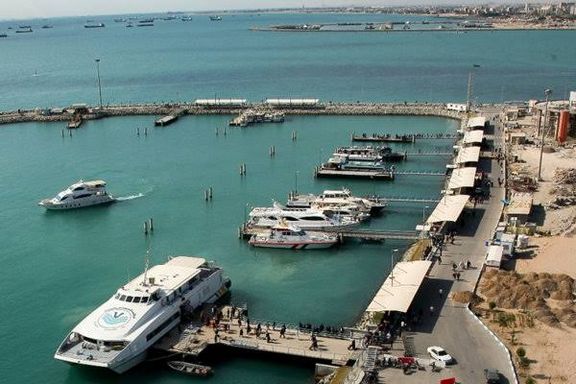
Military forces have killed at least two and injured several others in the Iranian port city of Kargan, amid protests of fishermen fighting a trawling ban in the area.
In a years-long battle, the regime has prohibited fishermen from working in that part of the coast, instead leasing it to China. Amidst the country's dire economic situation, tensions continue to rise.
Rights group Haalvash claims two Afghans were killed with four others injured in the clashes, though other reports on social media have cited as many as seven deaths. It is as yet unconfirmed and unreported by any state affiliated media.
Images circulated on Saturday show security forces firing upon citizens, and additional photos reveal snipers positioned on the minaret of the mosque.
The incident follows a prior military intervention on October 30, during which forces raided the port and set fire to fishermen's boats, marking a troubling pattern of violence in the region.
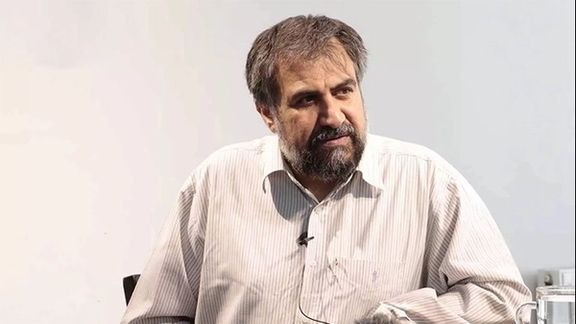
The Special Clerical Court in Shiraz sentenced Shahabeddin Haeri Shirazi, the son of the city’s former Friday Prayer Imam, to three years in prison.
Haeri, who has expressed criticisms against the leadership of Ali Khamenei, the Supreme Leader of the Islamic Republic, took to his Telegram channel to inform followers that he appeared before the Special Clerical Court on Saturday, receiving a three-year prison sentence.
The charges against Haeri Shirazi include "spreading falsehoods against Ruhollah Khomeini, founder of the Islamic Republic" resulting in a two-year imprisonment and a fine of 150 million rials (approximately 300 dollars). Additionally, he is accused of "engaging in propaganda against the system," leading to another one-year prison term.
The Special Clerical Court also imposed restrictions on Haeri, preventing him from participating in online activities for three years and blocking his Telegram channel, deeming it an "instrument of committing a crime."
Shahabeddin Haeri Shirazi is the son of Mohiyeddin Haeri Shirazi, a cleric who held the position of Representative of the Supreme Leader in Fars Province and Friday Prayer Imam of Shiraz for 27 years, appointed first by Ruhollah Khomeini and later by Ali Khamenei.
During some years of his father's leadership, Shahabeddin took on the role of the representative and Friday Prayer Imam in Shiraz. However, in recent years, he has been critical of the role of Ruhollah Khomeini in the early stages of the Iran-Iraq War and has voiced concerns about the governance style of Ali Khamenei.

In September, Iranian state television shut down its Jam-e Jam channel, designed to convey the Islamic Republic's message to millions of expats in the diaspora.
The closure, largely overlooked by Iranian media and officials, underscored the regime's struggle to propagate its ideological messaging among Iranians who had emigrated to avoid exposure to such totalitarian and biased content.
Saeed Fanian, a former manager of Jam-e Jam, contends that the channel's shutdown highlights the breakdown of the state television organization's monopoly on TV broadcasting. He specifically pointed the finger at Vahid Jalili, the deputy chairman of IRIB (Islamic Republic of Iran Broadcasting), for lacking the necessary expertise to lead the channel.
Fanian also criticized IRIB Chief Peyman Jebelli for failing to fulfil promises to restore the broadcaster's credibility. According to Fanian, a successful television program should challenge authorities and convince the audience of its fairness -- elements he believes the state TV failed to achieve.
Fanian, an Iranian academic headed IRIB's newsroom from 1988 to 1994 and the Jam-e Jam channel from 2003 to 2009. He believes that the state television launched Jam-e Jam to confront the influence of foreign-based satellite television channels which were new in the Iranian media landscape in the 1990s.
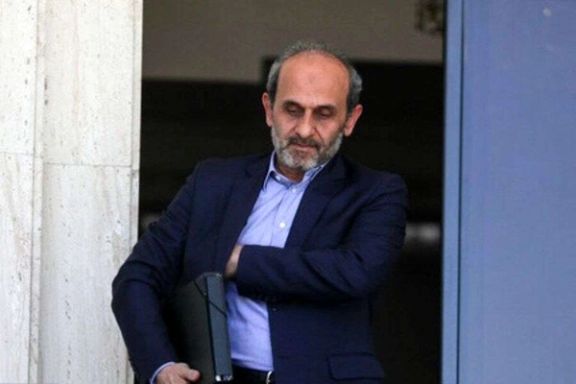
However, with the proliferation of more foreign-based professional Persian networks after 2009, the channel lost its appeal for expatriates, who appreciated the transparent political slant of the foreign-based networks. The viewership of Jam-e Jam's three channels for Europe, US and Australia began to drop and during the past years only one of the three channels were beaming to Europe and parts of the United States. However, even Iranian officials admitted that very few Iranian expats tuned to Jam-e Jam for news or entertainment.
Toward the end of its lifetime as hardliners at home pushed their radical cultural policies, the channel stopped broadcasting Iranian music which was more or less the only interesting program on Jam-e Jam after 2009. On the other hand, the channel did not have anything to offer to Iranians who became increasingly politically minded after the disputed presidential election in 2009 and particularly with the start of major protest demonstrations in 2017. There was no trace of the protests and dissent in general on the channel whatsoever.
It was around the same time that major foreign-based channels including Iran International, BBC Persian and Manoto TV began to offer more programming on Iran's domestic politics and hot issues such as human rights violations in Iran. They catered to the needs of Iranians inside and outside of the country for accurate and unbiased information about events in the country.
In his interview, Fanian admitted that Jam-e Jam was somewhat successful before these channels appeared on the Iranian media landscape. While he still believes that Jam-e Jam's winning edge toward the end of its activity was broadcasting Iranian TV sitcoms, a recent report on Kahabr Online website indicates that the state TV lost its edge as online platforms in Iran started to produce their own series with less radical censorship.
A study cited by Khabar Online reveals that despite the state TV's monopoly on broadcasting and its extension of censorship to video-on-demand (VOD) services, TV series produced by the state were significantly less successful than those offered by VOD platforms. Notably, even though state TV provided its content for free, VOD series such as "Fatal Wound" and "Return" had nearly double the viewership of all state TV series combined. Another example is the comedy series "How Many Springs There Are in A Lifetime," which has maintained successful viewership on VOD platforms for over five months.
The decline in viewership extends to both news programs and entertainment shows on state TV and its Jam-e Jam channel, losing audiences to online platforms within Iran and foreign-based satellite television channels. Polls conducted domestically and internationally corroborate the substantial drop in state TV viewership. As a result, the government may find it increasingly difficult to justify investing funds in a propaganda machine that has lost its efficacy.
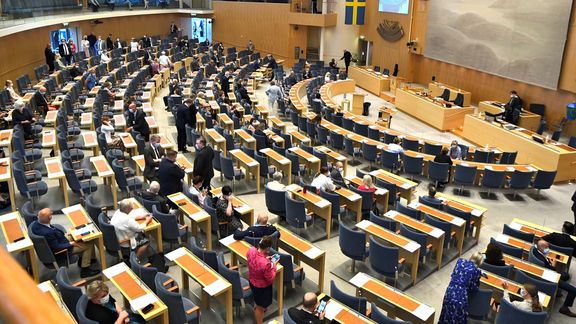
On November 8th, five Swedish lawmakers called on the European Union and global governments to prohibit the sale of surveillance equipment and software to Iran.
Led by Nima Gholam Ali Pour, an Iranian-born member of Sweden’s parliament (Riksdag), the lawmakers issued a statement condemning the Iranian government’s use of “intrusive mass surveillance technologies” to “disrupt peaceful assemblies and enforce oppressive modesty laws.”
The open letter comes as international attention to Iranian protests has diminished in response to Israel’s war with Hamas – even as news reports detail how Iran’s regime funds, arms, and trains Hamas fighters. However, protecting and empowering Iran’s opposition may offer the clearest pathway to regime change, and by extension, disrupting Tehran’s ability to export terrorism abroad.
“Regime change in Iran is the most effective way to neutralize the mullahs and their covert and overt campaigns in the region,” Mr. Gholam Ali Pour said when asked how demonstrations in Iran impact the Middle East, adding that Iranians view “the mullah’s expansionism in the region” as “a waste of resources.”
Beginning in September 2022, Iran was gripped with nationwide, women-led protests following the death in police custody of Mahsa Amini, a 22-year-old student who was forcibly detained for improperly wearing her hijab. Iran’s regime reacted to the months-long demonstrations by orchestrating a brutal crackdown, arresting thousands and subjecting peaceful protestors to torture and execution.

Mr. Gholam Ali Pour and his colleagues, who each hail from the right-wing Sweden Democrats party, referenced an Aug. 6 investigative report from the German broadcaster ARD. The report, which included interviews with Iranian activists, detailed how Iranian security forces used advanced “surveillance technologies purchased from European companies” to crush demonstrations and persecute Iranian women.
“These technologies form a crucial component of Tehran’s extensive surveillance network, which the theocratic regime uses to track political dissidents and suppress public criticism,” the MPs wrote.
According to ARD, the German manufacturing giant Bosch sold 8,000 closed-circuit television cameras to Iran’s regime between 2016 and 2018. Iranian activists showed ARD images of Bosch cameras and software used to monitor public spaces.
ARD claimed that Bosch cameras can be outfitted with “intelligent tracking,” an AI-based technology that allows for monitoring of vehicle and foot traffic. The parliamentary letter includes the account of an Iranian activist who described how the regime deploys cameras that issue an alarm whenever more than five to ten people gather in public, prompting security forces to arrive “‘within minutes’” to break up demonstrations.
The letter also points to an Amnesty International report, which “documented evidence of Iranian women driving through high traffic areas who received text messages from state security warning them about fines for improper wear of headscarves.” The women were identified through “facial recognition” software, according to Amnesty, a biometrics technology that maps facial features and compares unique identifiers to images in a massive database.
“The authorities are always watching so your behavior is in accordance with their idea of Islam,” Gholam Ali Pour said in an interview. “The regime in Tehran will use surveillance technology in the worst possible ways,” he added.
Germany isn’t the only country to host businesses that profit off the sale of surveillance equipment to Iran. Reporting for Iran International, Benjamin Weinthal described in August how Iran’s government purchased video cameras from companies in Sweden and the Netherlands, while the Danish security company Milestone Systems reportedly delivered video management software to Iran that is capable of facial recognition.
Both intergovernmental and non-governmental organizations have raised alarms concerning the use of surveillance technologies as an instrument of state oppression. In August 2022, the United Nations released a study warning about the “human rights” concerns associated with the systematic monitoring of public places using biometrics data. The study called for “data privacy legislation” and “robust well-tailored export control regimes applicable to surveillance technologies.”
In August, Mr. Gholam Ali Pour sent a formal Parliamentary Question to Tobias Billström, Sweden’s foreign minister, asking if he planned “to take action in the European Union and other forums” to ban the sale of surveillance technology to Iran, in light of the news reports concerning Bosch and other European companies.
Billström answered by stating that “Swedish trade with Iran is currently very limited.” As to the EU, the foreign minister pointed to the “sanctions regime against human rights abuses in Iran, established in 2011,” which he claimed, “includes a ban on selling or transferring certain equipment that could be used for repression or surveillance to Iran.”
However, EU sanctions against Iran, including the 2011 ban on “equipment which might be used for internal repression,” deal predominantly with military hardware, as well as devices and software used in the “monitoring or interception of internet or telephone communications.” The sale of surveillance cameras and facial recognition technologies are not explicitly forbidden.
For now, the law appears to be lagging advancements in technology, which offer abusive and tyrannical governments Orwellian control of their societies. With rising tensions in the Middle East, the EU should immediately adopt the Swedish MPs recommendations and proscribe European businesses from selling surveillance equipment to Iran. Otherwise, profit-seeking corporations stand to damage and impede the greatest natural bulwark against Iran’s military adventurism: the Iranian people.
The opinions expressed by the author do not necessarily reflect the views of Iran International

What if a Sunni imam plays a central role in advocating for freedom in a Shia-majority country ruled by Shiite clerics and gains significant traction.
It may seem unlikely, especially in a country like Iran with a hostile regime. While suspicions about Iranian imams being conservative and reactionary are understandable, Mowlavi Abdolhamid (Abd ul-Hamid), a Sunni cleric in southeastern Iran, challenges these stereotypes. Contrary to the image of a radical jihadist, Abdolhamid seeks peace, an end to bloodshed, and has attracted fellow Iranians with his message.
If Iran’s ongoing revolution leads to the establishment of a secular government, promoting religious freedom, women’s rights, and ending the murderous mistreatment of religious and ethnic minorities, one of its influential figures could be Sunni Muslim Abdolhamid. In fact, a Sunni Muslim is playing a central role in undoing the catastrophe of the 1979 Islamic revolution in Iran.
Thousands of Iranians of diverse backgrounds flocked to his mosque, Makki, in Zahedan (capital of Sistan-Baluchestan province, southeast of Iran) in March 2023 to celebrate the Iranian new year (a secular celebration) and to hear his message of hope and resistance. Abdolhamid stands out as a cleric who is both hated by the current ruler Ali Khamenei and immensely popular among the Iranian people. Despite being a member of the Sunni minority, he is increasingly more popular and has become a symbol of an Iranian renaissance. Despite efforts to tarnish his reputation, leaked documents reveal Khamenei's advice to ruin Abdolhamid's standing has not diminished his popularity.
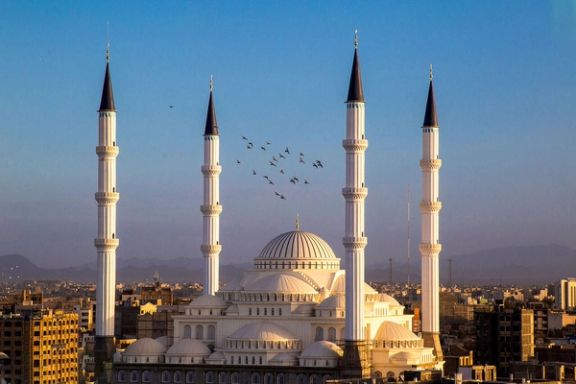
According to Abdolhamid's office, the security forces of the Islamic Republic have been pursuing the assassination plot of this staunch mowlavi who has been defending of the rights of all Iranian citizens. Abdolhamid was one of the many Iranian Sunni imams in Shia-governed Iran who supported the ongoing uprising that began with the death of Masha Amini in September 2022. Abdolhamid has been repeatedly attacked by the authorities and the propaganda horns of the government, his assistants were prosecuted and jailed, and his loyalists were shot at.
Abdolhamid has notably broken traditional Shiite clerical taboos, such as welcoming women without hijab to his mosque during Iranian New Year travels and advocating for the equal rights of Baha'is and non-believers. His outspoken criticism extends to blaming Khamenei for the deaths of approximately 100 protesters in Zahedan on September 30, 2022, condemning the shooting of protesters, executing dissidents, and addressing issues of torture and rape in prisons.
A noteworthy outcome of the 2022 revolution is the participation of Iranian Sunni clerics in the national, secular, and freedom-oriented movement alongside the people. Unlike adherents of the Shiite political theory of governance and its sectarianism, Sunni clerics, particularly those aligning with the religious sentiments of their regions, swiftly joined the protesting masses. Abdolhamid, the imam of Zahedan's Makki Mosque, stands out due to his clear articulation of the general demands of the people in Sistan-Baluchestan and across Iran.
Abdolhamid's consistency in his positions, including abandoning previous stances, has garnered him popularity among protesters and regime opponents. Notably, he revisited past positions like congratulating the Taliban and supporting Ebrahim Raisi in the contested elections of 2021. Every Friday, during his leadership of prayers in Zahedan, Abdolhamid aligns himself with the positions of the protesters.
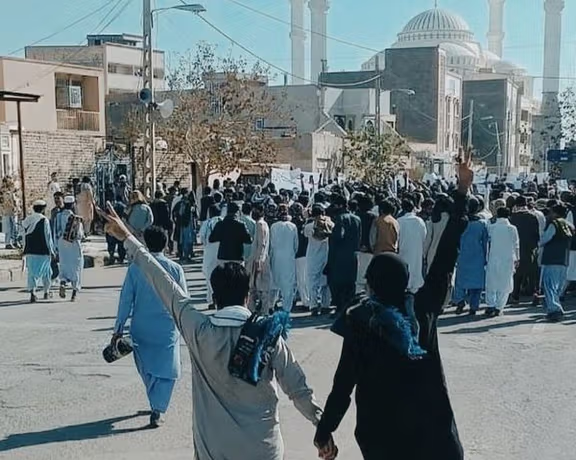
Paths to a world without Islamism
Following the onset of the Mahsa Revolution, Abdolhamid emerged as a staunch opponent of sectarianism and Islamism within the government. He guides Muslim believers toward the separation of religion and state. One path is to normalize and recognize intellectual and ethnic diversity in the Iranian public arena. "Religious views cannot create equality in this intellectual and ethnic diversity. The religious view in the country will eventually fail," he says.
Focusing on government efficiency, he rightly points out the ineffectiveness of the Islamist government due to Islamist politics. He clearly identifies Islamism as responsible for the current failed state of governance: "What happened in Iran was due to a denominational view; denomination is a branch of religion. Denomination means a narrow perception and religion has a wider circle. The denominational view became dominant in Iran, and limited the view and opinion and limited the plans.” In this speech, he refers to Islamism as a [political] religion.
Abdolhamid highlights the contradiction between Islamism and meritocracy. He is well familiar with the dimensions and results of the anti-secular government in this area. From his point of view, the root of this ideological selection is the idea that the government represents God. "No one can claim to be God's representative," he argues.
He firmly opposes the involvement of clerics in governmental affairs and decision-making processes. Abdolhamid contends that the country's challenges and protests cannot be addressed solely through lectures and sermons by preachers, or eulogists. Instead, he emphasizes the necessity of thoughtful minds, and experienced and compassionate individuals to tackle these issues.
Abdolhamid advocates for the legal equality of all citizens, rejecting notions of "insiders" and "outsiders," as well as ideological and political supremacy within a patriarchal system. He underscores the idea that all Iranians are citizens of Iran, united as brothers and sisters, transcending sectarian distinctions. Abdolhamid dismisses concerns about differences between Shiites and Sunnis, asserting that there are no such distinctions, and emphasizes that all Iranians, regardless of ethnicity, aspire to enjoy equal rights.
Public education about secularism
Similar ideas have been articulated by Iranian political activists and analysts, both within and outside the country, for years. However, hearing these sentiments from a Sunni Friday Imam, who enjoys popularity not only among the Baluchis but also among Sunni Kurds, and others is particularly noteworthy. Abdolhamid's influence extends to religious individuals opposed to the government. Since the Mahsa Revolution, he has skillfully primed the minds of millions of Sunni believers to embrace secularism. While he may not explicitly use the term "secularism," he has gradually preached and elucidated the dimensions of this concept.
Failure of Shiite Reformist clerics
No Shiite cleric in the social and religious position that Abdolhamid enjoys has defended secularism to such an extent, including former ‘reformist’ president Mohammad Khatami and other “progressive” clerics.
These reformists do not believe in the separation of religion and state because they want reforms for the survival of Islamist government and religious rule and their own return to power, and not for a secular system of government.
Abdolhamid, a thorn in the government's throat
The government faces significant challenges in attempting to remove Abdolhamid, and such an action would come at a high cost for several reasons: 1) it would be difficult to close Friday prayers for a government claiming religious legitimacy, 2) he enjoys support from Baluch believers and leaders of Baluch clans and tribes, 3) the potential for a high cost in terms of security and potential backlash, as witnessed in the September 30, 2022, massacre, and 4) the resilience of the Baluch people for more than year of opposing the regime, gaining solidarity with other Iranians.
Today, Abdolhamid has garnered popularity among Iranians due to his ability to understand and echo the sentiments and demands of the majority of freedom-loving and secularist Iranians, despite being a traditionalist cleric. Any attempt to impose house arrest, terror, or exile, as used against opposition leaders in border regions, would pose considerable risks for the regime, especially when public sentiment is largely against the government.
The opinions expressed by the author do not necessarily reflect the views of Iran International.